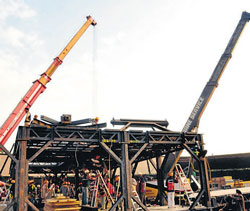
Chandigarh, November 30: It is a sort of an epitome of architectural efficacy. Engineers in Punjab’s Mohali have set their sight on erecting a 10-storey building in the next 48 hours. Work to accomplish the unprecedented feat started on Thursday.
Businessman Harpal Singh, who conceived the project, claimed that the “building will be an energy efficient model with one sample floor fully furnished.” Engineers in charge of the project said the whole building was pre-fabricated. Components like doors, floors, water supply and wiring components were ready and needs to be fitted as the building scales up. A special transportation vehicle was deployed to ferry the components to the building site.
“Doors just need to be fitted. Water supply components, wiring, sanitation, air conditioning ducts are ready to be installed,” Singh said. Punjab Deputy Chief Minister Sukhbir Singh Badal laid the foundation stone of the building, INSTACON, on Thursday.
The idea behind the exercise, Singh said, was to draw attention towards a better, energy efficient construction technology that will enable builders and owners generate revenue within days, instead of waiting months together for the building to be completed.
Hundreds of workers, engineers and technicians are involved in the project. “The technology could revolutionise the infrastructure sector and speed up construction of commercial towers, luxury hotels, high-rise buildings, hospitals, educational institutions, universities and retail outlets,” Singh said. Architects, planners and engineers from various places have been invited to witness the construction.
Badal said the Punjab government will soon notify a new policy for attracting investment in the realty sector. The policy will be in the public domain by December 15. “The new policy is aimed at making it hassle-free for the investors, ensuring time bound clearances, besides offering various other incentives. Punjab will like to encourage high-rise buildings. The government plans to construct two lakh EWS houses in the next one year and the new building technology unveiled today could be used in such houses.”
Punjab DGP S S Saini was also present at the event.





Comments
Add new comment